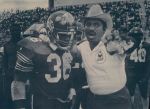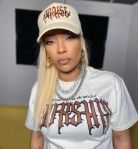Shonda Rhimes may have gotten attention for being labeled an “angry black woman,” but when it comes to the Ebola crisis, the label suits Isha Sesay more than the TV show creator.
According to the CNN International (DStv 401) anchor, it’s the media who are to blame for slanting coverage of the disease so much that it’s resulted in fear of anyone from Africa by U.S. residents.
“I am an angry black woman. I have a very tense relationship with the story because I’m living in the United States but my family is in Sierra Leone. My mother, brother, grandmother – most of my family – are in Sierra Leone right now,” Sesay said while speaking as a panelist in a media forum session during the 2014 CNN MultiChoice African Journalist Awards 2014. The event was held at the Serena Hotel in Dar es Salaam, Tanzania.
“I’m in a place where America has taken this, in my words ‘bizarre’ approach to this public health emergency on our continent and the media in the United States has made it all about them and their few cases,” said Sesay. “I was at the airport a couple of weeks ago and the driver was picking me up. I was there at the baggage carousel. And he said ‘Where are you from?’ And I said ‘I’m from Sierra Leone.’ And he took a step back from me.”
“And I thought: ‘Wow. How wretched a job have we done as the media that people think that just because I’m from Sierra Leone, that just being in my presence, regardless of whether I was in Sierra Leone or not, that I’m somehow inherently a carrier of Ebola,” she continued.
Sesay cited the lack of knowledge and empathy in the U.S. as the reason behind the country’s handling of Ebola. The eboladeeply.org co-founder’s criticism of the media touched on so much focus on America and the fear of Ebola taking of the Western Hemisphere, rather than the people suffering and impacted by the crisis.
“I’m the co-founder of eboladeeply.org because I want to change the discourse around Ebola and really bring in the voices of our people who are suffering, who may not be suffering from the disease directly but are being impacted,” she said. “The media need to hold the international community to account, to say ‘Where are you?’ We have an Ebola UN emergency fund and there’s very little money in it. We have pledges being made, but the pledges aren’t being translated into action. We have some countries saying they’re going to step up and a lot of countries sitting on the sidelines.”
“Where are we as the media asking those questions and holding people accountable, and staying on the stories and not averting our gaze and being sidetracked to cases of three people in the United States – people whose lives are valuable, critical – we don’t want anyone to die, but again, the epicentre is on the African continent. The responsibility lies with the journalists here in Africa to ask the questions,” Sesay mentioned.
“We have to realize that the clock is ticking. The world has never anything like this and the world really doesn’t know how to deal with numbers that is being put out there that could become a reality. The media needs to do their part in getting the facts out, asking the questions, staying on this story and tracking it and looking at the resources coming into countries.”
“There’s a lot of stories to be told. There’s an information gap here, she added. “In the absence of information there’s hysteria. And there’s inertia.”
Like BlackAmericaWeb.com on Facebook. Follow us on Twitter.
(Photo Source: Twitter)















